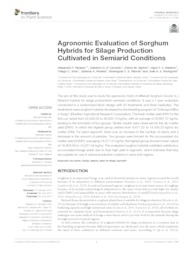Agronomic evaluation of sorghum hybrids for silage production cultivated in semiarid conditions.
Agronomic evaluation of sorghum hybrids for silage production cultivated in semiarid conditions.
Author(s): PERAZZO, A. F.; CARVALHO, G. G. P.; SANTOS, E. M.; BEZERRA, H. F. C.; SILVA, T. C.; PEREIRA, G. A.; RAMOS, R. C. S.; RODRIGUES, J. A. S.
Summary: The aim of this study was to study the agronomic traits of different Sorghum bicolor (L.) Moench hybrids for silage productionin semiarid conditions. It was a 1-year evaluation conducted in a randomized block design with 24 treatments and three replicates. The treatments were sorghum hybrids developed by the breeding program of ?Embrapa Milho e Sorgo? (Brazilian Agricultural Research Corporation). The fresh matter yield (FMY) in the first cut varied from 22,643.56 to 44,033.15 kg/ha, with an average of 32,607.37 kg/ha, leading to the formation of two groups. Similar results were observed for the dry matter yield (DMY), in which the highest group yielded from 9,471.32 to 14,540.23 kg/ha dry matter (DM). For plant regrowth, there was an increase in the number of stems and a decrease in the amount of panicles. Two groups were formed for the accumulated dry matter yield (ADMY), averaging 14,217.91 kg/ha; the highest group showed mean values of 18,003.00 to 14,221.94 kg/ha. The evaluated sorghum hybrids exhibited satisfactory accumulated forage yields due to their high yield in regrowth, which indicates that they are suitable for use in animal production systems in semi-arid regions.
Publication year: 2017
Types of publication: Journal article
Unit: Embrapa Maize & Sorghum
Keywords: Forragem, Inflorescência, Matéria seca, Panícula, Rebrota, Silagem
Observation
Some of Embrapa's publications are published as ePub files. To read them, use or download one of the following free software options to your computer or mobile device. Android: Google Play Books; IOS: iBooks; Windows and Linux: Calibre.
Access other publications
Access the Agricultural Research Database (BDPA) to consult Embrapa's full library collection and records.
Visit Embrapa Bookstore to purchase books and other publications sold by Embrapa.

